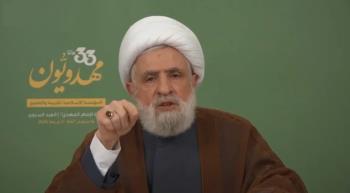Alwaght- Turkish President Recep Tayyip Erdogan made a two-day visit to the self-proclaimed Turkish Republic of Northern Cyprus on July 19. Making the visit just two days before the Eid Al-Adha, the Turkish leader promised he would share "good news" while being there. The political experts believe that Erdogan’s trip to the Turkish part of Cyprus at was controversial and carried special political and symbolic goals. Its coincidence with the failure of the Erdogan's efforts for de-escalation with the European countries made the visit even more important.
Erdogan, in an address to the parliament of the autonomous region, said that the unity of the self-proclaimed republic was on top of the political considerations.
"Today, we declare to the world the eternal brotherhood between Turkey and the Turkish Republic of Northern Cyprus, which gets its power from the blood of our martyrs," said Erdogan.
Making the visit coincident to the Eid Al-Adha as one of the most important ceremonies of the Muslims, Erdogan seeks to send symbolic signals and messages to the Europeans.
Indirect messages of Erdogan to Europe
Erdogan's visit to Northern Cyprus had two symbolic and political goals.
Symbolically, the visit cane with two aims. July 20 marked the 47th anniversary of the Turkish military intervention in Cyprus. The significant point is that Erdogan made his speech at the Northern Cyprus parliament in this day, sending a message to the European countries and reminding them of the Turkish military power. Also, the visit was made during the Eid Al-Adha days, accentuating the Islamic identity of the Northern Cyprus. To understand these symbolic messages, developing an awareness of the Turkish-European approach to Cyprus issues is necessary.
The Republic of Cyprus gained its independence from Britain in 1960, and the independent government of Cyprus was established on the basis of the participation of the Turkish and Greek communities in the administration of the island, with Britain, Greece, and Turkey guaranteeing the sovereignty of the Cypriot government. However, with the intervention of the Turkish army in response to the coup of Greek nationalist militias, the island was divided into northern Turkish majority and southern Greece majority since 1974. The UN Security Council refers to the northern part of Cyprus as "occupied" and Turkey is the only country that recognizes it as a sovereign state.
Now Erdogan with his visit to the northern part and advocating the ongoing split of Cyprus is obviously challenging the European Union's policy on the island. The southern part, officially Republic of Cyprus, joined the EU in 2004 and since 2008 joined the Eurozone. Now the Turkish leader brazenly made a territorial stance on a member of the EU and called for independence of its Muslim-majority part. This should be read an apparent incompatibility of Turkey with the EU's general policy on Cyprus.
Politically, with his visit Erdogan made it clear to the Europeans that their procrastination and show of unwillingness to de-escalate tensions with Ankara will push it to opposition to the European bloc's policies in Eastern Europe and the Balkans states. Actually, Erdogan emphasized that Turkey more than any other time backs a split Cyprus.
"The history and painful experiences we have lived in the case have made it clear to everyone that the Greek part is reluctant to form a participatory state. The only lasting solution in Cyprus can be an approach based on the facts of the island. It is no longer possible to believe them and lose another 50 years," he said backing a two-state solution.
The comments carry a political message: Erdogan knows no boundaries in his support to the Northern Cyprus and even finds it fruitless to talk to the Greek Cyprus. The importance of the issue gets even clearer as we know that Cyprus is one of the EU members.



























